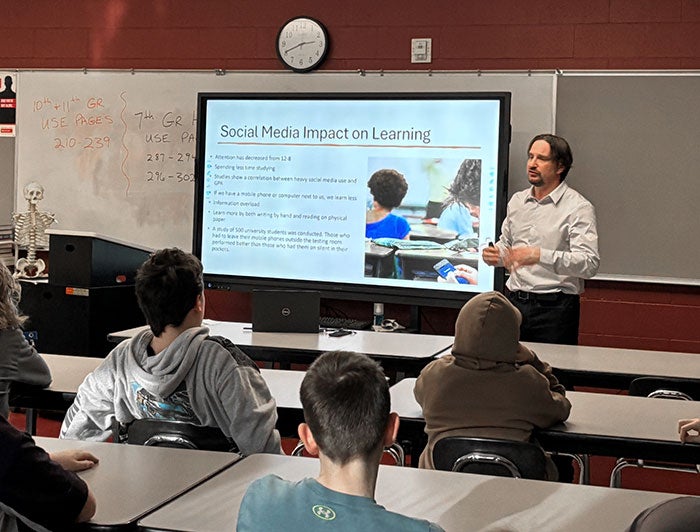Community Collaboration Addresses Teens’ ‘Digital Balance’ and Helps Improve Their Mental Health

Aspirus Lake View Hospital in Two Harbors, Minn., is working to improve teens’ mental health by addressing their use of digital devices and the lingering effects of the COVID-19 pandemic. With grant support from Cooperative Light and Power and the Lake View Foundation and in partnership with Lake County Public Health, Aspirus Lake View sent mental health professionals, nurse practitioners and researchers to local schools where they engaged with teens, teachers and staff.
Participating in small group sessions and attending larger assemblies, students were given practical tips on using social media in a healthy and balanced way, along with information on well-being, mental health terminology and community resources for further support.
Bringing Together Key Players
Several organizations in the community worked together, contributing insights, resources and expertise to this initiative.
- Aspirus Lake View wrote the grants and coordinated with the partners to ensure that sessions could take place.
- Lake County Public Health provided research, statistics, access to a variety of funding sources and a connection with the local schools.
- Schools in Lake Superior School District hosted events and were very open to interventions.
- Aspirus Lake View Two Harbors Clinic and the Human Development Center coordinated sending their mental health professionals to schools to engage and educate the teenagers.
- Pruitt Center for Mindfulness and Well-Being at University Wisconsin-Superior provided a guest speaker who was well-versed in well-being research and mental health strategies.
- Cooperative Light and Power and the Lake View Foundation provided funding support.
Initial Challenges in Working Together
- Schools naturally needed to allocate a lot of time for academic and curricular needs, making it hard to find time for extra programs.
- Reaching the whole student body at once was difficult, so the community partners developed creative approaches and ensured smooth coordination.
- Mental health professionals had to take time away from providing patient care to participate in the school sessions.
Lessons Learned
Every partner brought their own areas of expertise and various resources to the table. This broad group of people needed to cover a wide range of educational topics, coordinate the events and obtain all the funding. To improve community health and make the biggest impact possible, it’s vital to pool everything together and collaborate.
Key Advice to Enhance Collaborations for Better Health
Do not work in silos. Communicate, network and share.
Contact
Rachel Gischia
Manager, Community Outreach and Emergency Preparedness
Aspirus Lake View Hospital
